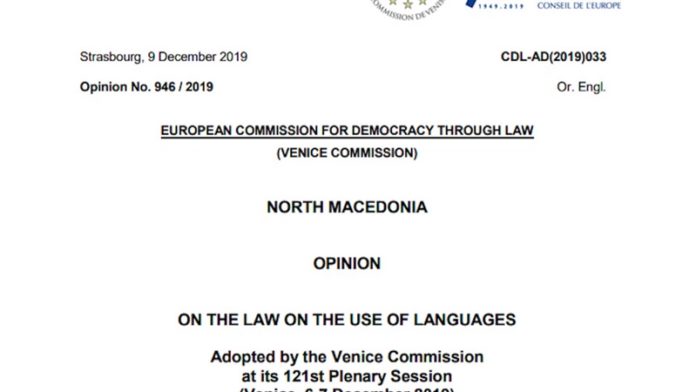The Venice Commission of the Council of Europe today published its final opinion on the controversial law on the use of the Albanian language in Macedonia. As announced in the preliminary opinion, the Commission has strong objections to the law, the way it was adopted, how it goes beyond the Macedonian Constitution and European norms, and adds unmanageable burdens on the country.
Macedonia is called to re-examine the law and to organize widespread consultations with all stakeholders before doing so. The opinion condemns the lack of debate before the expedited adoption of the law. It condemns the “unrealistic” obligations that it imposes on the public institutions, which are now required to use the Albanian language as official even in areas with little to no Albanians, and even if they have no Albanian speakers employed. Just the implementation of the provisions of the law in the judiciary, which are described as overly broad, would require years and years of preparations, the Commission found.
Overall, the clauses of the law are found as unclear and not precise or too broad. Regarding the clause that there should be bilingual currency and army and police uniforms, the Commission says they are outside of European norms, but not unprecedented.
In general, the Venice Commission insists that it is not clear where the Albanian language will be used as official – which central and local institutions, which independent institutions, if it applies to private companies… The Commission also objects to the possibility of imposition of the Albanian language to individuals who don’t speak it, as a violation of the personal right to freedom of expression. According to the Commission, the use of a minority language is a right, but can’t become an imposition.
The move by the Venice Commission caused a major rift in the ruling SDSM – DUI coalition, which is based on the Tirana platform – a series of maximalist requests by the ethnic Albanian parties which the now outgoing Prime Minister Zoran Zaev agreed to implement. Zaev initially said that he will respect the opinion of the Venice Commission, but after his Deputy Prime Minister Bujar Osmani evoked the prospect of return to war, he backed down and said that the law will stay as it is.




Comments are closed for this post.